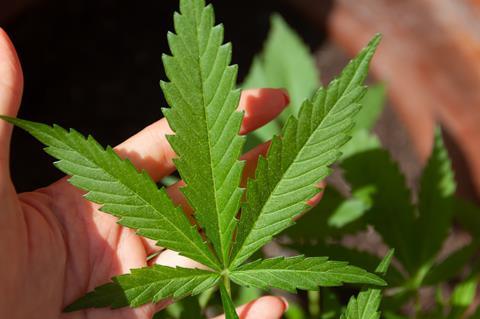Cannabis could become an important weapon in the battle against Covid-19, with a new review suggesting both cannabinoids and terpenes show great promise in lab research, due to their antiviral qualities.
The review, which has been published in the Journal of Applied Microbiology, an Applied Microbiology International publication, examines a number of lab-based studies that highlight the antiviral qualities of cannabis in countering the effects of viral infections including COVID-19, HIV, HCV and HSV.
Dr Wee Sim Choo, who compiled the review ‘Cannabis as antivirals’ with her team in Monash University Malaysia, said that while COVID-19 vaccines have been developed, infections are unlikely to end in the near future, simply due to the fact that the vaccine has limited availability and decreasing efficacy in light of the emerging variants and the human population in which the virus has comfortably entrenched itself. We thus have no choice but to live with it and continuously seek ways to protect ourselves from future outbreaks.

“Scientists are eager to develop novel therapeutic agents against SARS-CoV-2 to minimise infections and hospitalisations,” she said.
“It is impossible to predict when the next pandemic will occur as they are random events. Intriguingly, cannabis compounds have shown to have broad antiviral actions, as they exhibit antiviral activity against several common viral infections in humans.
“Therefore, when a new infectious disease outbreak occurs, cannabis compounds could be a potential treatment for the new virus. Furthermore, once cannabis and cannabinoid drug development are fully studied, this novel pharmacologic approach could potentially turn COVID-19 into a mere seasonal illness that can be much more easily handled, and be less threatening to public health.”
Plant-based treatments
In current clinical practices, some 80% of antibiotics, anticancer, cardiovascular and immunotherapy treatments are derived from plants and the medicinal value of the cannabis plant has proven to be much higher than expected, Dr Choo said.
“Besides the significant improvement in various types of pain and muscle spasticity, cannabis has surprisingly proven to possess antiviral effects. This review is very apt for the occasion, and highlights available literature on this subject and we hope this will become an essential tool to provide concise and better insights on the potency of cannabis against different viral infections such as SARS-CoV-2, HIV, HCV, and HSV,” she said.
Preliminary findings from in vitro studies suggest that cannabinoids can act on both the early and late stages of COVID-19 by first inhibiting viral entry and replication in human host cells, and later inhibit the subsequent aggressive immune response that is harmful to host cells. They also inhibit viral RNA replication, viral protein synthesis and virus infectivity by 70%, 80%, and 90%, respectively.
Meanwhile, terpenes are able to block SARS-CoV-2 attachment to the human host receptor and are highly effective in inhibiting the replication of SARS-associated coronavirus, while monoterpenes, including beta-pinene and limonene, reduce HSV-1 infectivity by 100% when interacting directly with free virus particles.
Cytokine storm
“COVID-19 patients with poor prognosis are usually associated with the “cytokine storm”, which is also deemed as the main cause of mortality,” Dr Choo said.
“This is a condition of the hyperactive immune system in response to the infection, characterised by a sudden surge of inflammatory mediators produced by immune cells as an effort to clear the microbe, but to a level that is harmful to our own cells.
“Cannabinoids have the potential to restrict the release of these cytokines, effectively suppressing the exuberant immune reaction.
“Besides, cannabinoids and terpenes, the two main compounds of cannabis, are able to inhibit viral entry by targeting the human host cellular receptor and viral surface protein, respectively.”
During viral infection, the viral surface protein binds to the cellular receptor present on surfaces of respiratory tract epithelium to enter the host cells, Dr Choo said.
“Cannabinoids reduce the expression of the receptors on host cell surfaces, whereas terpenes bind to the viral protein to block viral attachments to host cells,” she said.
“Finally, both compounds were found to be effective in inhibiting the RNA genome replication and the subsequent viral protein translation and maturation, preventing the generation of viable virus progeny. Nevertheless, these findings have to be investigated in in vivo research and clinical trials to examine the efficacy and safety of cannabis in Covid healthcare.”
Restricted investigations
Because cannabis is an illicit drug, in vivo investigations are tightly restricted and clinical evidence is limited. Dr Choo cautioned that the findings in the studies reviewed may not translate into practical applications and further in vivo and clinical studies are needed to validate the findings.
“Owing to the broad antiviral actions of cannabis compounds, cannabis may not be avoided in treating viral infections. However, the use of cannabis is still under tight control across countries due to the health risk posed by cannabis misuse,” she said.
“Consequently, clinical trials are largely restricted despite promising preliminary laboratory results. Hence, education on rightful cannabis use is important to improve cannabis application and ensure safe access to cannabis.
“This could motivate more in vivo and clinical research to further understand the therapeutic feasibility of cannabis and the associated negative consequences, subsequently contributing to the increased use of cannabis as a regimen for viral illnesses.”







No comments yet